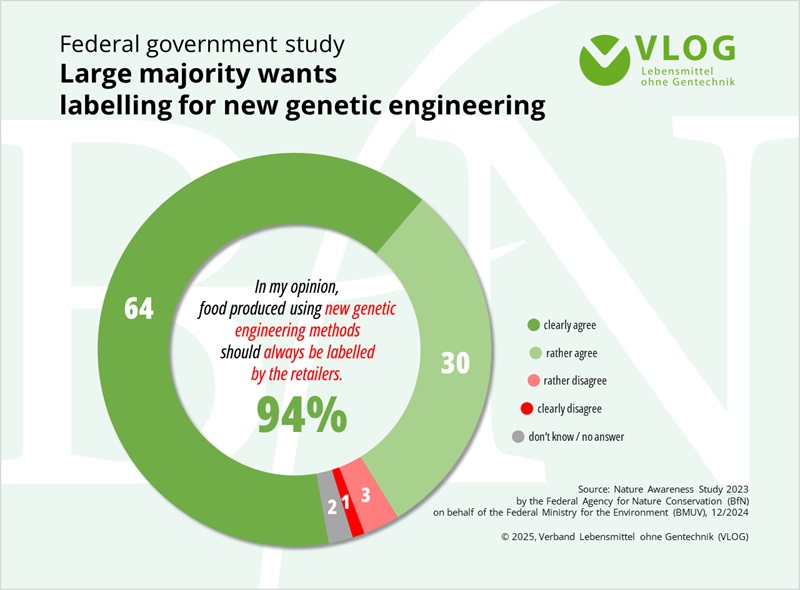News
Mandate for new government coalition: 94 percent want labelling of new genetic engineering
According to the recent "Nature Awareness Study" by the Federal Agency for Nature Conservation (BfN), 94 percent of adults in Germany are "completely" or "somewhat" in favor of foodstuffs produced using new genetic engineering methods always being labelled by retailers.
Obligatory labelling missing from Council position so far
The new joint Council position of the EU Member States of 14 March 2025 does not include such a labelling requirement up to the end product for the majority of future genetically engineered products. This was one of the reasons why Germany did not vote in favour. The European Parliament, on the other hand, is calling for comprehensive mandatory NGT labelling. In the trilogue negotiations between the Council of Ministers, Parliament and the EU Commission, it is now important to enforce this minimum requirement.
New coalition government must advocate transparency
Alexander Hissting, Managing Director of the Association for Food without Genetic Engineering (VLOG): "It couldn't be more clear. The more than clear majority preference of citizens is a mandate for the parties CDU-CSU and SPD, as the new German governmen, to campaign for comprehensive, transparent GMO labelling at EU level t. They should already commit to this in their coalition agreement. The parties CSU and SPD, in particular, have repeatedly committed themselves to GMO-free labelling and transparency."
Lack of NGT labelling would be detrimental to the economy
"Mandatory NGT labelling is also a must for the food industry and in particular for the billion-euro "Ohne Gentechnik" (Non-GMO) and organic markets. Otherwise, there is a threat of incalculable liability risks, costs and effort, which would ultimately also make food more expensive. NGT deregulation without this important detail would be extremely damaging to the economy. The parties, CDU, CSU and SPD, cannot ignore this. This is not about a ban on NGTs, but about the need for transparency."
Council of Ministers majority in favour of deregulation could soon be gone again
Although the NGT labelling requirement has not yet been included in the majority position of the EU member states, it may well make it into the final regulation in the trilogue negotiations. Parliament is calling for it. And the EU states are also far less united on this than it seems. Belgium, for example, has agreed to the position, but in an additional declaration is calling for a comprehensive NGT labelling obligation - as well as a patent ban, risk assessments and coexistence rules. This could mean that the deregulation majority in the Council of Ministers is already gone.
CDU-CSU and SPD coalition: Good signs for genetic engineering transparency
In the upcoming coalition of the parties CDU-CSU and SPD, the prospects for a clear stance in favour of consumers and the economy may even be slightly better overall than with the Traffic Light coalition. Before the election, the SPD had spoken out in favour of "clear regulations for traceability and labelling of products produced using new genetic engineering techniques". According to the Social Democrats (SPD), the labelling of such products is "indispensable". And the CSU has a long tradition of criticising genetic engineering. For example, the then CSU Federal Minister of Agriculture, Ilse Aigner, launched the federal "Ohne GenTechnik" seal in 2009. GMO-free farming is also enshrined in Bavaria's current coalition agreement between the CSU and the Free Voters. "Bavaria is GMO-free and will remain so", promised Bavarian Agriculture Minister Michaela Kaniber (CSU) only last year.
Nature Awareness Study by the BfN
The frequently updated Nature Awareness Study by the Federal Agency for Nature Conservation (BfN) was last published in December 2024 (Nature Awareness Study 2023). Furthermore, the majority of respondents do not believe that the long-term consequences of new genetic engineering methods are foreseeable and do not want to consume genetically modified food themselves.
Nature Awareness Study 2023 (BfN) (German)
Majority position of EU Member States: Major need for improvement in NGT deregulation
European enterprises call for rigorous labelling of NGTs
Özdemir supports demands for freedom of choice and coexistence
Legal opinion: Do not shift liability risks for new genetic engineering to the EU food industry!

